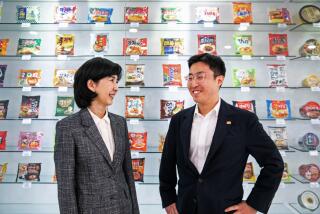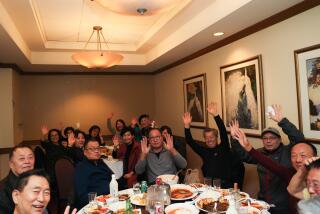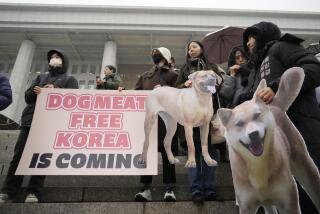North Korea flouts ban on luxury goods, South Korea charges
The news reports detail such conspicuous consumption as imported top-shelf whiskey and designer brands such as Gucci, Armani and Rolex, not to mention Big Macs flown in daily from China.
As North Koreans are said to be facing debilitating food shortages, the government continues its shopping spree for the pampered elites of Pyongyang flouting international sanctions against the authoritarian regime, South Korean government officials say.
North Korea’s importing of luxury goods from China nearly doubled in the first five months of this year, compared with the same time period for 2010, according to a report by Beijing customs officials obtained by the South Korean Unification Ministry.
The communist regime spent $46 million on imported corn, rice and other food staples, but it also spent $10 million on luxury items from January through May of this year. Imported through China, the items reportedly include Marlboro cigarettes, Hennessy cognac, whiskey and Japanese beer, South Korean officials said this week, quoting the Chinese customs report.
The imports included about $500,000 worth of high-grade beef, apparently for luxury meals, which North Korean leader Kim Jong Il uses to maintain the support of the power elite, Seoul officials said.
The imports come despite United Nations Security Council sanctions on North Korea that were imposed after the regime conducted nuclear tests in 2006 and 2009. Though the sanctions bar Pyongyang from exporting conventional weapons and importing luxury goods, China, North Korea’s main trading partner, appears willing to overlook the measure, Unification Ministry officials told South Korean news media.
Since reports of famine in the 1990s, North Korea has relied on global food aid to feed its population of 24 million. This year, the regime again requested food aid, citing reduced crop yields. Though the European Union plans to send $14.5 million in food aid, the United States and South Korea have been reticent to supply such aid.
Some scholars believe that North Korea has exaggerated its need for food, alleging that the aid is turned over to the military or stored for future use, such as a planned celebration next year to mark the anniversary of the regime.
“I do not believe these claims about mass starvation,” said Andrei N. Lankov, a professor at Kookmin University in Seoul and the author of several books on North Korean history and politics.
He called the move by Pyongyang “a deliberate campaign to get free food, which will then be distributed to the privileged groups as government gifts. This will allow them to increase their legitimacy and win some popular support at the expense of the Western and South Korean taxpayers.”
Meanwhile, the regime continues its spending spree. Pyongyang elites reportedly have McDonald’s hamburgers delivered to their homes from China via Air Koryo, North Korea’s flagship airline.
“This is the dilemma Western policymakers face, whether to overlook excesses and concentrate on the poor,” said Daniel Pinkston, deputy project manager of the Northeast Asia Program for the nonprofit International Crisis Group.
“North Korea isn’t the only place with a two-tiered system, but it is an extreme example,” he said. “And the inequality seems only to be increasing.”
More to Read
Start your day right
Sign up for Essential California for news, features and recommendations from the L.A. Times and beyond in your inbox six days a week.
You may occasionally receive promotional content from the Los Angeles Times.







